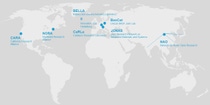Who we are
Collaborations with academia
Our global network with excellent universities, research institutes and companies is an important part of our Know-How Verbund. We collaborate with eight Academic Research Alliances und around 250 universities and research institutes to achieve our growth targets.

In our collaborations we offer scientists from universities and research institutes the opportunity to participate in close-to-practice research projects and thereby to create added value for our society by developing innovative solutions. Therefore, we maintain close relations with many universities and research institutes around the world. We collaborate with many individual research groups all over the world. Collaboration is all about bringing the right people together to work on challenging and meaningful problems. BASF is highly interested to invest in such relationships to grow together with its partners.
With our Academic Research Alliances, we take collaboration one step further: Our Academic Research Alliances focus on research groups from multiple universities in regional proximity or with specific research focuses and thus form a global network of our world class academic partners. Our eight Academic Research Alliances are complemented by collaborations with around 250 universities and research institutes as well as collaborations with a large number of companies.
Our eight Academic Research Alliances:
- CARA (California Research Alliance)Location: USA: West coast, California
Universities: University of California (UC) Berkeley, UC San Diego, UC Riverside, Stanford University, Caltech, UC Davis, UC Santa Barbara, UC Irvine, UC San Francisco, UC Los Angeles, University of Southern California
Focus areas: Bioscience, Catalysis, Digitalization, Formulation, Materials, Polymers - NORA (Northeast Research Alliance)Location: USA: East coast, Massachusetts
Universities: Harvard University, Massachusetts Institute of Technology, University of Massachusetts Amherst
Focus areas: Materials, Polymers, Digitalization and Bioscience - BELLA (Battery and Electrochemistry Laboratory)Location: Germany: Karlsruhe Institute of Technology (KIT)
Focus areas: Electrochemistry, Batteries - JONAS (Joint Research Network Advanced Materials & Systems)
Location: France, Germany, Switzerland
Universities: Strasbourg University, Freiburg University, ETH Zurich
Focus areas: Monomers, Polymers and Polymer Materials, Supramolecular Chemistry, Biobased and Bioinspired Materials and Systems, Surface Design and Modification, Innovative Materials for Construction, Additive Manufacturing

- CaRLa (Catalysis Research Laboratory)Location: Germany: University of Heidelberg
Focus areas: Raw materials, Homogeneous Catalysis - BasCat (UniCat BASF Joint Lab)Location: Germany: Technische Universität Berlin (TU Berlin);
Focus areas: Heterogeneous Catalysis - il (Innovation Lab Heidelberg)
Location: Germany: Heidelberg
Focus areas: Organic electronics - NAO (Network for Asian Open Research)Location: Asia: China, India, Japan, South Korea
Universities: Tsinghua University, Beijing University of Chemical Technology, Sichuan University, Zhejiang University, Fudan University, Changchun Institute of Applied Chemistry under Chinese Academy of Science, Dalian Institute of Chemical Physics under Chinese Academy of Science, Tokyo Institute of Technology, Kyoto University, Seoul National University, Indian Institute of Technology Bombay, National Chemical Laboratory, Pune
Focus areas: New Mononers, Polymers and Applications, Digitalization and Smart Manufacturing, Catalysis, Battery, Chemical and Process Engineering, Surface and Interfaces, Coatings and Insecticide
Closely connected through an Academic Partnership Developer
A dedicated scientist from BASF, the so called Academic Partnership Developer (APD) is assigned to the Academic Research Alliance. An APD resides on site. It is their job to connect the Academic Research Alliance with BASF, and to represent BASF at the Academic Research Alliance. The APD is actively looking for new technologies of interest to BASF, and identifies opportunities and initializes new collaboration projects. In some cases a framework agreement between BASF and the Academic Research Alliance enables a fast start of new projects. In other cases, the APD will facilitate the contract between the legal departments of the Academic Research Alliance and BASF.

